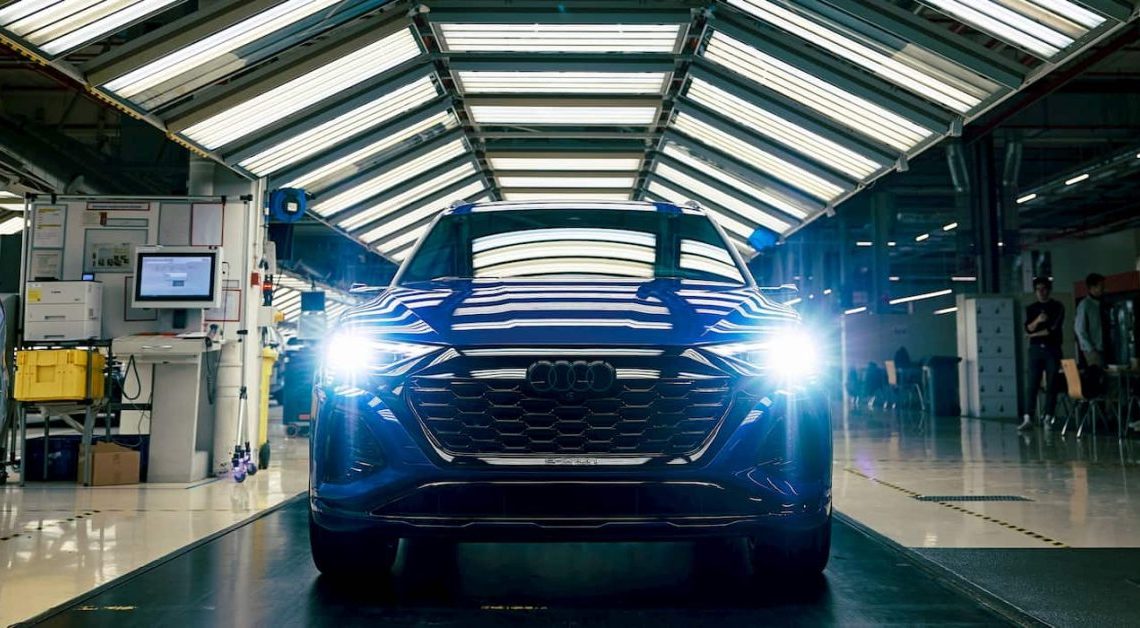
People are angry, cars aren’t selling, and now for the first time ever Volkswagen is likely to close one of its factories in Europe – the state-of-the-art Brussels plant that makes the Audi Q8 E-Tron.
Back in September, Volkswagen-owned Audi said that it wanted to stop production on the Q8 E-Tron – an €80,000 electric SUV that barely anyone in Europe can afford – and put the factory up for sale. Meanwhile, VW has been looking for investors or other workarounds, with the company now saying that none of the 26 interested parties offered any viable solutions for the future of the plant, as reported by Automotive News Europe.
Also Read: Brussels Airport Installs 700 EV Chargers with No Idle Fees
An internal search within the company for future car production or alternative uses for the plant was also deemed fruitless, according to the report. “It is important to me that we quickly create clarity in the information and consultation process and now focus further on the social plan discussions,” Volkswagen-owned Audi COO Gerd Walker told Automotive News Europe. “We will continue to pursue this in a trusting, objective, and fair manner.”
For one, we can’t overlook the dismal sales numbers for the Q8 E-Tron, with the 120,000-vehicle-capacity plant reaching its peak in 2022 with 47,900 cars, compared to 37,400 Q8 E-Trons last year. This year, Audi has delivered 23,900 vehicles.
But other issues have also plagued the Belgian plant. For one, it is located on a railway line, making expansion impossible, and there is no body shop on site, meaning imported body components have to be supplied from other plants. The successor to the Q8 be made in Mexico, and Audi doesn’t plan to move any new models to the Belgian plant.
The 3,000 factory workers employed there will likely lose their jobs, which is stirring up pushback from unions that argue that the company is too resistant to consider other offers. “The only thing they want to do is close the plant as quickly as possible.,” said Ronny Liedts of the ACV-CSC union, as quoted in Automotive News Europe. “None of the alternatives work for them.”
Last month, huge rallies blocked the Belgian capital over the potential closing of the plant, with unions warning of further strikes and protests. Now, the factory has become a symbol for what protestors say is the real problem: It’s not that people don’t want to drive EVs, it’s that European automakers are focusing on large SUVs that the average person can’t afford.
“Car manufacturers wanted to make big profits with electric vehicles right away and did not accept that the transition phase would generate fewer dividends and profits,” Hillal Sor, a trade unionist at Metallos FGTB, told Euronews. “So they bet everything on large, very luxurious, very expensive models that European citizens cannot afford.”
Sales figures back this up: The first eight months of this year, some 902,000 electric cars were purchased in the European Union, representing only 12.6% of the total number sold. To support the EV transition, unions say that are pushing for more public funds. The European Parliament agreed last month to consider tariffs on Chinese EVs and other protectionist measures are on the table.
Meanwhile, Volkswagen massive production overcapacity at its German sites is forcing the company to consider, for the first time ever, closing a factory on its own home turf.
Author: Jennifer Mossalgue
Source: Electrek




The factory is not state-of-the-art. It was founded 55 years ago, when labour and ground in Brussels were cheap. The inexpensive variants of the Rabbit (Golf) were assembled there from delivered parts, there is no pressing plant. But times have changed. Belgium is now rich and especially Brussels as the headquarters of the EU. In Brussels, labor is scarce and land is very expensive. There is no such large contiguous area in the middle of Brussels again. It is obvious to close this factory and sell the property expensively.